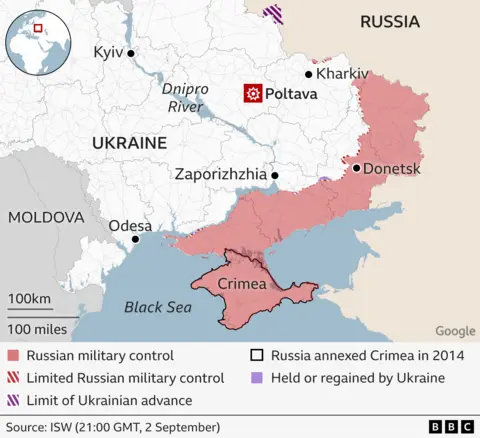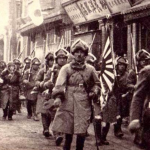

At least 51 people have been killed and 271 others injured in a Russian missile strike on the city of Poltava, in central Ukraine.
A military academy and a nearby hospital were hit. Ukraine’s land forces confirmed that military personnel were killed in the attack.
People did not have enough time to get to bomb shelters after the air raid alarm sounded, Ukraine’s ministry of defence said.
President Volodymyr Zelensky promised that what he called “Russian scum” would pay for the attack, and repeated calls for more air defences so that Ukraine could protect itself by carrying out its own long-range missile attacks. Moscow has not commented on the attack.
People nearby told us their windows were blown out by the force of the impact.
We met 26-year-old Mykyta Petrov, a cadet who only started at the Poltava Military Communications Institute two weeks ago.
He described the moment the attack unfolded just after 09:00 local time on Tuesday morning (06:00 GMT), saying the second missile hit just three seconds after the first.
“I ran outside, there was smoke and dust everywhere…lots of people were outside having a cigarette, and many were killed…”
He says that what he saw has affected him psychologically, that there was “too much blood, too many dead bodies.”
Earlier reports from Russian military bloggers suggested that cadets were gathered at a military parade being held at the institute, but the ministry confirmed there was no parade happening at the time of the strike.
Alarms sounded at 09:08 local time and everyone headed to the shelter, the defence ministry added. The explosions started a few minutes after the alarms.

‘A cunning and cynical Russian strike,’ says governer
Poltava regional governor Philip Pronin called the attack a “cunning and cynical Russian strike,” and later said that 15 people were still thought to be trapped under the rubble.
Mr Pronin said search groups were on site, and that 10 residential buildings had been damaged in the attack.
More details could not immediately be given due to security reasons, he said.
Ukraine’s first lady Olena Zelenska posted on X calling the attack “a stunning tragedy for all of Ukraine,” and added: “Russia is taking away the most valuable thing from us – life.”
In a video on the Ukrainian presidential website, President Zelensky said Russia would be held accountable for the strike.
In the clip, which was also posted on X, Mr Zelensky said a “full and prompt” investigation had been ordered and that “all necessary services are involved in the rescue operation”.
He went on to say that Ukraine needed long-range air defence systems “that can protect us from Russian terror” and added that “every day of delay, unfortunately, means more lost lives”.
The UK’s Foreign Secretary David Lammy condemned the “sickening act of aggression in Putin’s abhorrent and illegal war in Ukraine,” and said “my thoughts are with all the victims and their loved ones.”
US National Security Council spokesman John Kirby, meanwhile, described the attack as “another horrific reminder of Putin’s brutality towards the people in Ukraine,” and said that Washington would be sending Kyiv more military aid in the coming weeks.
Germany’s Foreign Minister Annalena Baerbock said that Vladimir Putin “knows no limits to brutality”.
There has also been criticism of the Ukrainian authorities in the aftermath of the attack.
Maria Bezugla, a Ukrainian MP who often criticizes the country’s military leadership, accused officials of putting soldiers in danger.
“These tragedies keep repeating themselves. When will it stop?” she wrote on Telegram.
Since the attack, changes within the Ukrainian government have been announced – with potentially more to come.
The minister in charge of weapons reduction resigned on Tuesday and one senior lawmaker for Mr Zelensky’s party said a “major government reset” was coming that would see more than half of minsters change.
“Tomorrow a day of sackings awaits us, and a day of appointments the day after,” David Arakhamia said.
The attack on the military institute in Poltava came as Russian leader Vladimir Putin arrived in Mongolia – his first visit to an International Criminal Court (ICC) member since it issued a warrant for his arrest last year.
Poltava, located in central Ukraine, had a pre-war population of 300,000 and is located 300 kilometres (189 miles) east of Kyiv.
Founded in the 1960s, when Ukraine was still part of the USSR, the Poltava military communications institute trains telecommunications specialists.
with additional reporting by Kyla Herrmannsen


